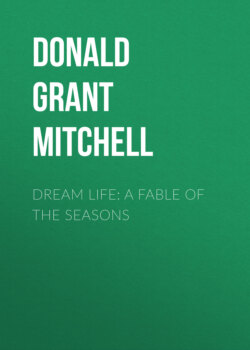Читать книгу Dream Life: A Fable of the Seasons - Donald Grant Mitchell - Страница 11
На сайте Литреса книга снята с продажи.
Spring.
ОглавлениеThe old chroniclers made the year begin in the season of frosts; and they have launched us upon the current of the months from the snowy banks of January. I love better to count time from spring to spring; it seems to me far more cheerful to reckon the year by blossoms than by blight.
Bernardin de St. Pierre, in his sweet story of Virginia, makes the bloom of the cocoa-tree, or the growth of the banana, a yearly and a loved monitor of the passage of her life. How cold and cheerless in the comparison would be the icy chronology of the North;—So many years have I seen the lakes locked, and the foliage die!
The budding and blooming of spring seem to belong properly to the opening of the months. It is the season of the quickest expansion, of the warmest blood, of the readiest growth; it is the boy-age of the year. The birds sing in chorus in the spring—just as children prattle; the brooks run full—like the overflow of young hearts; the showers drop easily—as young tears flow; and the whole sky is as capricious as the mind of a boy.
Between tears and smiles, the year, like the child, struggles into the warmth of life. The old year—say what the chronologists will—lingers upon the very lap of spring, and is only fairly gone when the blossoms of April have strown their pall of glory upon his tomb, and the bluebirds have chanted his requiem.
It always seems to me as if an access of life came with the melting of the winter's snows, and as if every rootlet of grass, that lifted its first green blade from the matted débris of the old year's decay, bore my spirit upon it, nearer to the largess of Heaven.
I love to trace the break of spring step by step: I love even those long rain-storms, that sap the icy fortresses of the lingering winter—that melt the snows upon the hills, and swell the mountain-brooks—that make the pools heave up their glassy cerements of ice, and hurry down the crashing fragments into the wastes of ocean.
I love the gentle thaws that you can trace, day by day, by the stained snow-banks, shrinking from the grass; and by the gentle drip of the cottage-eaves. I love to search out the sunny slopes by a southern wall, where the reflected sun does double duty to the earth and where the frail anemone, or the faint blush of the arbutus, in the midst of the bleak March atmosphere, will touch your heart, like a hope of Heaven in a field of graves! Later come those soft, smoky days, when the patches of winter grain show green under the shelter of leafless woods, and the last snow-drifts, reduced to shrunken skeletons of ice, lie upon the slope of northern hills, leaking away their life.
Then the grass at your door grows into the color of the sprouting grain, and the buds upon the lilacs swell and burst. The peaches bloom upon the wall, and the plums wear bodices of white. The sparkling oriole picks string for his hammock on the sycamore, and the sparrows twitter in pairs. The old elms throw down their dingy flowers, and color their spray with green; and the brooks, where you throw your worm or the minnow, float down whole fleets of the crimson blossoms of the maple. Finally the oaks step into the opening quadrille of spring, with grayish tufts of a modest verdure, which by-and-by will be long and glossy leaves. The dogwood pitches his broad, white tent in the edge of the forest; the dandelions lie along the hillocks, like stars in a sky of green; and the wild cherry, growing in all the hedge-rows, without other culture than God's, lifts up to Him thankfully its tremulous white fingers.
Amid all this come the rich rains of spring. The affections of a boy grow up with tears to water them; and the year blooms with showers. But the clouds hover over an April sky timidly, like shadows upon innocence. The showers come gently, and drop daintily to the earth—with now and then a glimpse of sunshine to make the drops bright—like so many tears of joy.
The rain of winter is cold, and it comes in bitter scuds that blind you; but the rain of April steals upon you coyly, half reluctantly—yet lovingly—like the steps of a bride to the Altar.
It does not gather like the storm-clouds of winter, gray and heavy along the horizon, and creep with subtle and insensible approaches (like age) to the very zenith; but there are a score of white-winged swimmers afloat, that your eye has chased as you lay fatigued with the delicious languor of an April sun;—nor have you scarce noticed that a little bevy of those floating clouds had grouped together in a sombre company. But presently you see across the fields the dark gray streaks, stretching like lines of mists from the green bosom of the valley to that spot of sky where the company of clouds is loitering; and with an easy shifting of the helm the fleet of swimmers come drifting over you, and drop their burden into the dancing pools, and make the flowers glisten, and the eaves drip with their crystal bounty.
The cattle linger still, cropping the new-come grass; and childhood laughs joyously at the warm rain, or under the cottage-roof catches with eager ear the patter of its fall.
----And with that patter on the roof—so like to the patter of childish feet—my story of boyish dreams shall begin.
